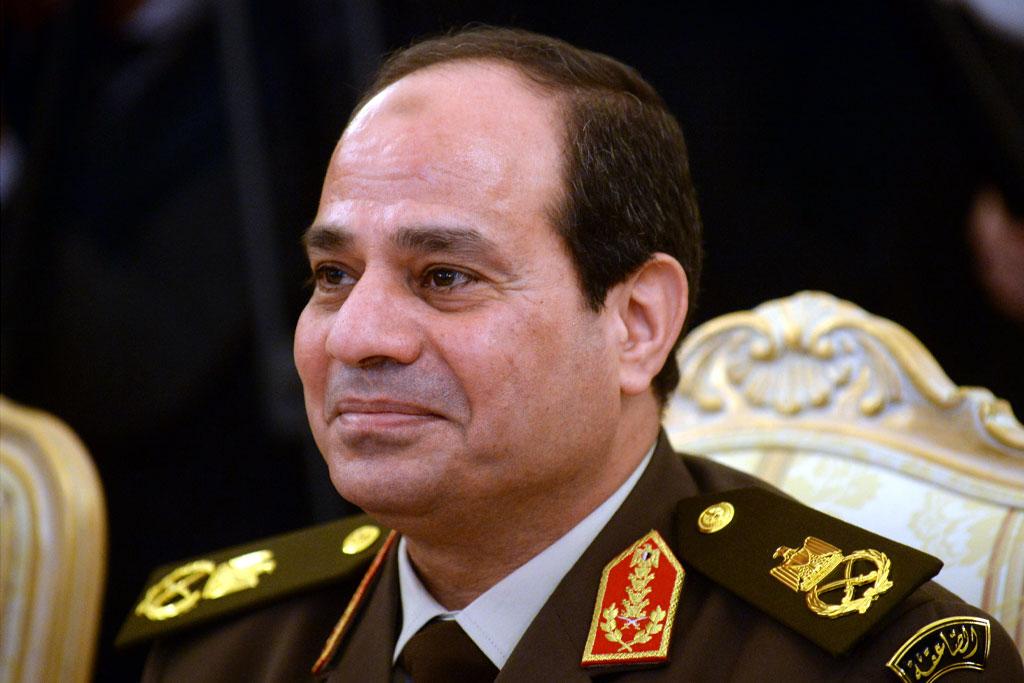Egypt’s government resigns, leaving path to presidency clear for army chief Sisi
Egyptian army chief Abdel Fattah Al-Sisi smiles during his meeting with Russian Defense Minster Sergei Shoigu and Foreign Minister Sergei Lavrov in Moscow, on Feb. 13, 2014.
Egypt's government resigned on Monday, paving the way for army chief Field Marshal Abdel Fattah Al-Sisi to declare his candidacy for president of a strategic US ally gripped by political strife.
After the July overthrow of elected Islamist President Mohamed Morsi and subsequent crackdown on Islamists and liberals with hundreds killed and thousands jailed, critics say Cairo's military-backed authorities are turning the clock back to the era of autocrat Hosni Mubarak era, when the political elite ruled with an iron fist in alliance with top businessmen.
"(The outgoing government) made every effort to get Egypt out of the narrow tunnel in terms of security, economic pressures and political confusion," Prime Minister Hazem el-Beblawi said in a live nationwide speech.
Beblawi, who was tasked by interim President Adly Mansour with running the government's affairs until the election, did not give a clear reason for the decision.
But it effectively opened the way for Sisi to run for president since he would first have to leave his post as defense minister in any case. "This (government resignation) was done as a step that was needed ahead of Sisi's announcement that he will run for president," an Egyptian official said.
He told Reuters that the cabinet had resigned en masse as Sisi did not want to appear to be acting alone.
Government spokesman Hany Salah said only: "This government feels that it did what it had to do in this critical period, and maybe it's time for a change."
Sisi has unveiled a political roadmap meant to lead to elections after toppling Morsi of the Muslim Brotherhood following mass unrest against his increasingly arbitrary rule.
But promises of democracy have not borne fruit in the biggest Arab nation, where hundreds of thousands of people gathered in 2011 in an army-backed uprising that overthrew Mubarak and raised hopes of a new political landscape.
The presidential vote is expected within months in Egypt, which has great geo-strategic importance due to its peace treaty with Israel and control over the Suez Canal, a vital global shipping lane and the shortest between Asia and Europe.
Zeroing in on the brotherhood
Egypt's stock market rose 0.26 percent after news of the government's departure to 8029.37 points, reversing losses from earlier in the day.
Morsi's removal touched off the bloodiest political crisis in modern Egyptian history, with security forces killing hundreds of Brotherhood supporters, jailing thousands and putting top leaders on trial.
The Muslim Brotherhood accused Sisi of plotting a coup to restore military-dominated government, and human rights groups say that abuses are spreading by the day, allegations the army-backed government denies.
Housing Minister Ibrahim Mahlab, a former official in Mubarak's National Democratic Party, was expected to be named prime minister of the new government, said a security source.
The Egyptian authorities are likely to remain preoccupied with efforts to further weaken and isolate the Muslim Brotherhood and fight a mushrooming Islamist insurgency.
The government has also clamped down on some secular activists who were instrumental in the popular uprising that deposed Mubarak, and who supported Morsi's removal. They are now languishing in prisons and face trial.
Compounding the instability, Islamist militants based in the widely lawless Sinai Peninsula have intensified attacks on police and soldiers, killing hundreds since Morsi's fall.
The Sinai-based group Ansar Bayt al-Maqdis claimed responsibility for a suicide bombing which killed two South Koreans last week, inflicting yet more harm on a tourism industry gutted by political turmoil and protests.
Ansar also said that it was behind assassinations of army and Interior Ministry officials.
A security source said Interior Minister Mohamed Ibrahim, who has been spearheading the campaign to crush the Brotherhood, was expected to retain his post in the hope he could provide tight security before elections. He survived an assassination attempt by a suicide bomber last year.
The Gulf Arab states of Saudi Arabia, United Arab Emirates and Kuwait, deeply suspicious of the Muslim Brotherhood, showered Egypt with billions of dollars in aid after Morsi's political demise.
That raised the morale of the government and filled state coffers. But any new government will be under pressure to come up with long-term plans to strengthen the tottering economy.
(Additional reporting by Tom Perry, Shadia Nasralla and Ali Abdelati; Writing by Michael Georgy; Editing by Mark Heinrich)
Every day, reporters and producers at The World are hard at work bringing you human-centered news from across the globe. But we can’t do it without you. We need your support to ensure we can continue this work for another year.
Make a gift today, and you’ll help us unlock a matching gift of $67,000!
